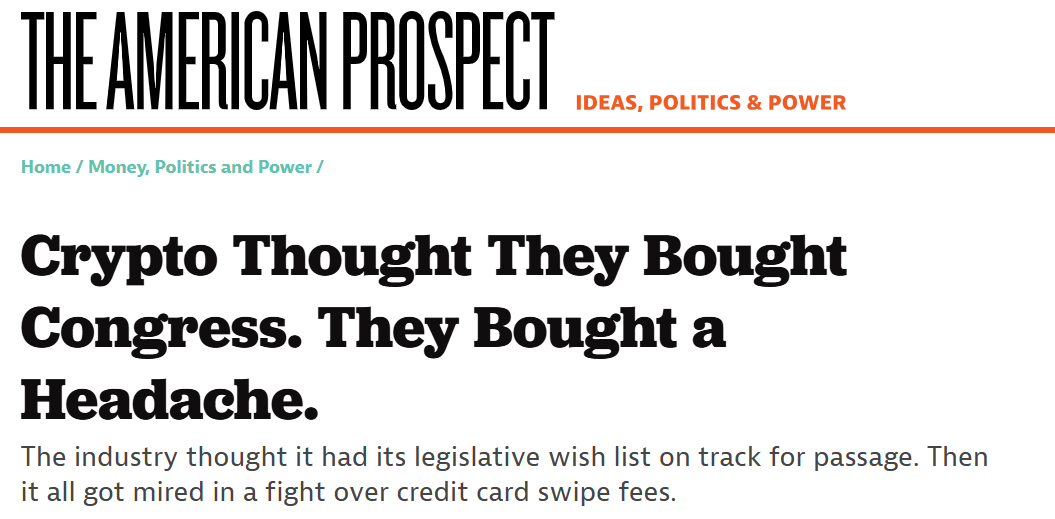Welcome to DU!
The truly grassroots left-of-center political community where regular people, not algorithms, drive the discussions and set the standards.
Join the community:
Create a free account
Support DU (and get rid of ads!):
Become a Star Member
Latest Breaking News
Editorials & Other Articles
General Discussion
The DU Lounge
All Forums
Issue Forums
Culture Forums
Alliance Forums
Region Forums
Support Forums
Help & Search
General Discussion
Related: Editorials & Other Articles, Issue Forums, Alliance Forums, Region ForumsCrypto Thought They Bought Congress. They Bought a Headache.

https://prospect.org/power/2025-06-09-crypto-thought-they-bought-congress-swipe-fees/

When we last left the bill known as the GENIUS Act, the fix appeared to be in. The crypto industry had spent millions in the 2024 elections to get a friendly regulatory regime, and GENIUS, which would sanction stablecoins and enable Big Tech firms to issue their own private currencies, was the opening salvo in a broad restructuring of the financial system to suit their ends. There was a minor hiccup in the form of Donald Trump’s orgy of crypto corruption, including a new Trump-issued stablecoin, which made it difficult for Democrats to effectively bless crypto’s codification. But they found a work-around, by pretending to fight Trump’s corruption with an amendment blocking presidents from issuing crypto assets that was designed to fail, after which they would happily sign on to the bill. That’s where we were headed. A motion to advance the GENIUS Act passed, with 16 Democrats joining nearly all Republicans. And final passage, after the amendments were disposed with, was scheduled to happen last week.
It did not. And the reasons for that are fascinating, due more to banking industry upset, and an idiosyncratic crusade by a right-wing Republican that the rest of his caucus doesn’t want to touch, rather than to some change of heart among Democrats. However, the pain imposed on the Democrats’ crypto collaboration has made it harder for the full deregulatory agenda to pass, and just maybe saved the nation from needless financial pain. First, some banking interests are working to stop the GENIUS Act. While the Independent Community Bankers of America has been largely mute, state-based organizations in Illinois and Texas have stepped up, citing numerous risks. They oppose Congress establishing a “shadow” sector of stablecoin-issuing non-banks, with access to Federal Reserve payment and lending services and the possible ability to pay interest on stablecoin deposits, without the same regulatory scrutiny that banks endure.
The Prospect has learned that both these community banking associations have been working on Capitol Hill to stop the bill, perceiving threats to their entire business model. But the bigger factor involves a core promise Senate Majority Leader John Thune (R-SD) made to get the top slot in leadership. He vowed a return to “regular order,” the process by which senators could offer amendments on the floor, with everyone having a chance to shape legislation. This concept stalled out under Harry Reid and Mitch McConnell, largely because the opposition party would force embarrassing amendment votes that the majority didn’t want to take. There haven’t been too many actual bills reaching the Senate floor since Thune’s promise. But the GENIUS Act was an early test. Thune did not “fill the amendment tree,” meaning that any senator could come to the floor and propose an amendment. Last week, Sen. Michael Bennet (D-CO) actually did it, offering a clarifying amendment that restrictions on “senior executive branch officials” in the bill would include the president and vice president.

But that’s not what’s giving Republicans and pro-crypto Democrats heartburn. Instead, it’s Sen. Roger Marshall (R-KS), who has filed his Credit Card Competition Act (CCCA) as an amendment to the bill. This has stalled the entire process. The CCCA, co-sponsored by Sen. Dick Durbin (D-IL), pits retailers against the Visa/Mastercard duopoly. The bill forces banks to offer alternatives to Visa and Mastercard for processing credit card transactions. The goal is to inject competition to prevent Visa and Mastercard from continuing to raise so-called “swipe fees,” something that has strangled retail businesses in recent years. Supporters say that it makes sense to attach legislation about payments to a crypto bill that also has a lot to do with payments. A previous battle on debit card swipe fees took years to resolve, as it forced Congress to mediate between two powerful business sectors.
snip